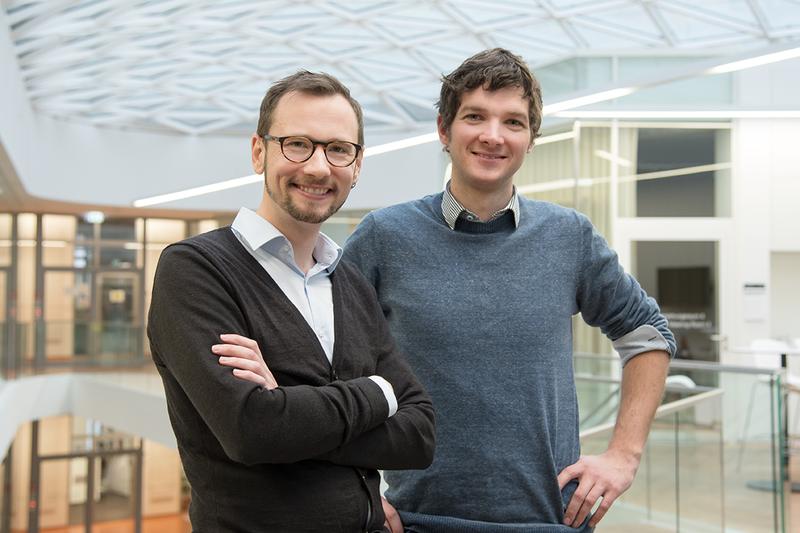

The scientists Martin Denzel (links) und Moritz Horn from the Max Planck Institute for Biology of Aging start up the new company ACUS
©Max Planck Institute for Biology of Ageing
The research group of Martin Denzel, group leader at the Max Planck Institute for Biology of Aging in Cologne has developed a method for defining the effectiveness of medicines.
The idea is funded by the EU with 150,000 euros for one year and enables the establishment of a company with which this method should become ready for the market.
“This is a once-in-a-lifetime opportunity”, says Martin Denzel about his new project which he advances with his postdoc Moritz Horn: the foundation of the ACUS Laboratories. The idea is based on the development of a method that will have great benefit for research and pharmaceutical companies.
The main focus during drug development for cancer for example lies mainly on the effectiveness of the substance. Where and how the drug actually works in the cell remains often unknown. ACUS Laboratories will close this gap of knowledge since their new method allows the precise localization and protein binding of the substance within the cell. With that not only the functionality of the drug can be revealed but also the drug can be further optimized for the depletion of undesired side effects.
“With our method, we can literally find the needle in the haystack”, explains Denzel. This also explains the companies name ACUS Laboratories. “Acus is latin for needle”, adds the scientist.
The project has now also gained the attention from the European Union and was awarded with the “Proof of Concept” Grant. This research funding is only available for scientists who are already funded by the EU. With 150,000 euros for one year the grant offers the researchers the required freedom they need to found their company.
“During this year, Moritz Horn will drive the founding of the company,” explains Denzel. For this, market analysis has to be carried out, a business plan needs to be developed and the new service further optimized.
An important step has already been completed: Martin Denzel and Moritz Horn found partners from science and industry. They work together with Josef Penninger and Ullrich Elling from the Institute of Molecular Biotechnology in Vienna, Austria, who took a great part in the development of the new technique.
The Max Planck Innovation GmBH will also support the company founders together with the Lead Discovery Center. Furthermore, another big pharmaceutical company has expressed their interest in the new development.
This project of Martin Denzel shows that basic research, which initially focuses on pure knowledge, can produce results that have a high economic relevance. “We believe that our method has the potential to become a new standard procedure in drug development,” says Denzel.












